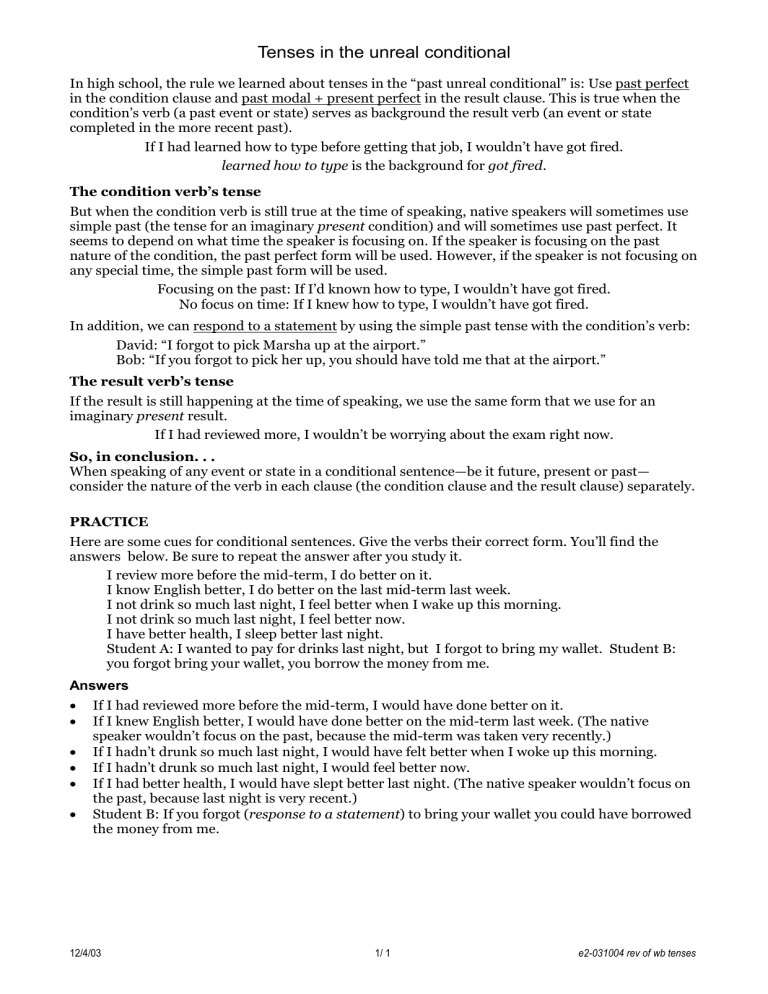
Tenses in the unreal conditional
In high school, the rule we learned about tenses in the “past unreal conditional” is: Use past perfect
in the condition clause and past modal + present perfect in the result clause. This is true when the
condition’s verb (a past event or state) serves as background the result verb (an event or state
completed in the more recent past).
If I had learned how to type before getting that job, I wouldn’t have got fired.
learned how to type is the background for got fired.
The condition verb’s tense
But when the condition verb is still true at the time of speaking, native speakers will sometimes use
simple past (the tense for an imaginary present condition) and will sometimes use past perfect. It
seems to depend on what time the speaker is focusing on. If the speaker is focusing on the past
nature of the condition, the past perfect form will be used. However, if the speaker is not focusing on
any special time, the simple past form will be used.
Focusing on the past: If I’d known how to type, I wouldn’t have got fired.
No focus on time: If I knew how to type, I wouldn’t have got fired.
In addition, we can respond to a statement by using the simple past tense with the condition’s verb:
David: “I forgot to pick Marsha up at the airport.”
Bob: “If you forgot to pick her up, you should have told me that at the airport.”
The result verb’s tense
If the result is still happening at the time of speaking, we use the same form that we use for an
imaginary present result.
If I had reviewed more, I wouldn’t be worrying about the exam right now.
So, in conclusion. . .
When speaking of any event or state in a conditional sentence—be it future, present or past—
consider the nature of the verb in each clause (the condition clause and the result clause) separately.
PRACTICE
Here are some cues for conditional sentences. Give the verbs their correct form. You’ll find the
answers below. Be sure to repeat the answer after you study it.
I review more before the mid-term, I do better on it.
I know English better, I do better on the last mid-term last week.
I not drink so much last night, I feel better when I wake up this morning.
I not drink so much last night, I feel better now.
I have better health, I sleep better last night.
Student A: I wanted to pay for drinks last night, but I forgot to bring my wallet. Student B:
you forgot bring your wallet, you borrow the money from me.
Answers
•
•
•
•
•
•
If I had reviewed more before the mid-term, I would have done better on it.
If I knew English better, I would have done better on the mid-term last week. (The native
speaker wouldn’t focus on the past, because the mid-term was taken very recently.)
If I hadn’t drunk so much last night, I would have felt better when I woke up this morning.
If I hadn’t drunk so much last night, I would feel better now.
If I had better health, I would have slept better last night. (The native speaker wouldn’t focus on
the past, because last night is very recent.)
Student B: If you forgot (response to a statement) to bring your wallet you could have borrowed
the money from me.
12/4/03
1/ 1
e2-031004 rev of wb tenses
